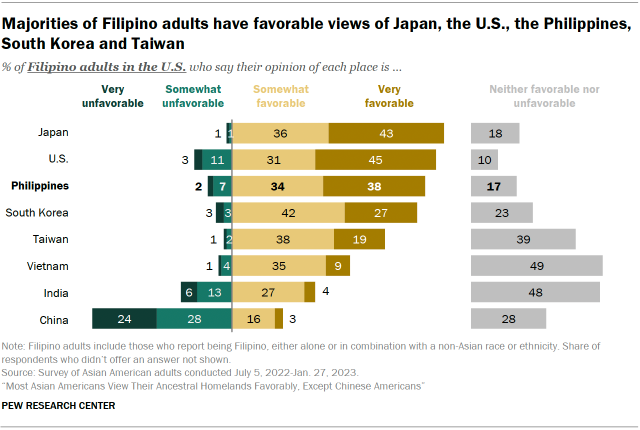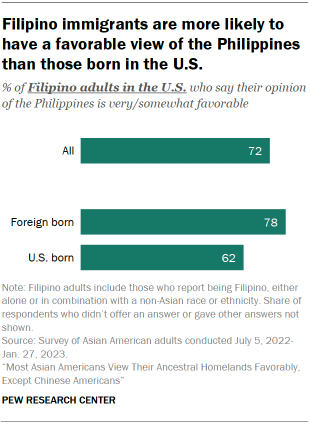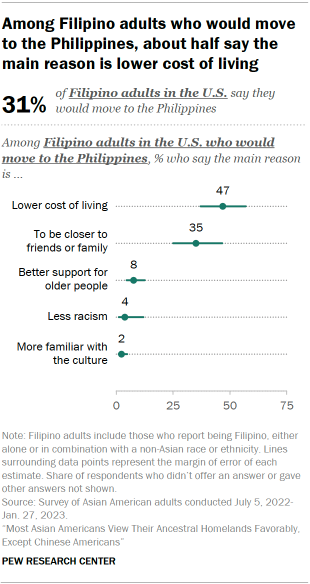Filipino adults see many places asked about in our survey favorably. About eight-in-ten (79%) hold a favorable view of Japan, including 43% who see it very favorably. Filipino Americans also have largely positive views of the United States, with 76% seeing it in a favorable light.
Filipino immigrants, Republicans and those 50 and older have particularly favorable views of the U.S., with nearly nine-in-ten of each group saying they see the place very or somewhat favorably.

“It’s hard to think of having […] America next to my nationality or to my identity because I have gripes about what the U.S. did to the Philippines in the past…. Although I love the opportunity that the U.S. gives me here … there’s still some bitterness. Like when you read about historical accounts that are well researched and you wouldn’t have read just on the internet, it stuck.”
– Immigrant man of Filipino origin, age 32 (translated from Tagalog)

A large majority of Filipino adults (72%) see the Philippines favorably. Only 9% say they hold an unfavorable opinion, and about two-in-ten say their opinion of the Philippines is neither favorable nor unfavorable.
Filipino immigrants tend to view the Philippines more positively than those who were born in the United States. Filipino immigrants are much more likely to have a very favorable view of the Philippines than U.S.-born Filipinos (45% vs. 26%). And U.S.-born Filipino Americans are more likely to see the country neutrally (27% vs. 12%).
When it comes to South Korea and Taiwan, a majority of Filipino adults say their opinion of each place is favorable.
About half of Filipino Americans say their opinion of Vietnam and India is neither favorable nor unfavorable. However, views of both places skew more positive than they do negative. For Vietnam, 44% hold a favorable opinion, compared with 5% with an unfavorable one. And for India, 31% view it positively, while 19% view it negatively.
Half of Filipino adults have an unfavorable view of China, with similar shares saying their opinion is very and somewhat unfavorable. On these views, there are some differences by education: Filipino adults with a bachelor’s degree or higher are more likely to have unfavorable views than those with less education.
Compared with other Asian adults,7 Filipino adults tend to have more positive views of the places asked about. They are more than twice as likely as other Asian adults to have a favorable view of the Philippines (72% vs. 30%). Filipino Americans are also more likely to see Japan and Vietnam in a positive light.
Two-thirds of Filipino adults say they would not move to the Philippines, though interest differs by nativity
Though a large majority of Filipino Americans have favorable views of the Philippines, most say they would not move there. Some 67% of Filipino adults say they would not move to the Philippines if they had the chance, while 31% say they would.

However, willingness to move to the Philippines varies significantly by place of birth. Filipino immigrants are about four times as likely as U.S.-born Filipino adults to say they would move to the Philippines (43% vs. 10%).
Among those who could see themselves moving to the Philippines, half say the main reason is lower cost of living. About one-third say proximity to loved ones is the main draw, while smaller shares point to better support for older people, less racism and more familiarity with Filipino culture.
“[I]n the Philippines, [the next generation] get Filipino opportunities. If they come here, they’ll get U.S. opportunities. And the scale will be much larger because America is bigger, and it’s a more advanced economy.”
– Immigrant man of Filipino origin, age 51 (translated from Tagalog)
“[Visiting the Philippines] was the biggest culture shock ever. I think … it did give me a new appreciation to be an American just because I saw the disparities and … different social classes, how hard it is to get a job out there…. [B]ut I did see a lot of beautiful nature and I got to see my provinces and all that, you know…. I did take a step back and had to appreciate the life that I do have.”
– U.S.-born woman of Filipino origin, age 27




